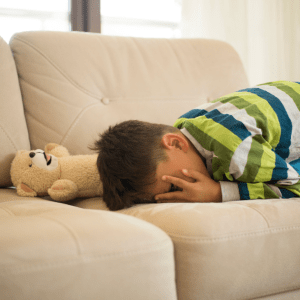
How do you think your kids experience you? Do they expect loving, positive attention and trust or criticism and judgement? Or no attention at all until they cause a problem? Watch yourself and see what they respond to.
Whenever you yell, threaten, punish, or use that blaming tone that turns your child “parent deaf”, you are teaching your children that they are a problem—because you see them as a problem. What you want is the problem to end, but what you are focusing on—what your child is doing wrong—makes the problem worse.
What you want to grow is your child’s capability.
So trust your child’s capability to overcome problems. This requires a mindset shift and understanding what trust really means. Your trust is needed 24/7, especially if your child is behaving in untrustworthy ways.
It’s not about trusting behavior or even your child’s current motivations. It’s about trusting who your child is and that he wants to do things right. The fact that things are going wrong can be corrected by your change in focus.








 A Connective Parent asked about how toddlers learn self-control. Every parent needs real-life solutions to tantrums.
A Connective Parent asked about how toddlers learn self-control. Every parent needs real-life solutions to tantrums. Q. My eight-year-old daughter has taken to lying and I don’t know what to do. The other day I was driving her home from a friend’s house. I looked in the rear-view mirror and saw her playing with legos that were not hers. Her friend has quite a collection. I asked her where she got them, and she told me that a friend at school had given them to her. I said that we had not brought them to her friend’s. She said she had put them in the car earlier to play with on the way home. Her brother told me later that she had taken them from her friend’s house. What is my next step?
Q. My eight-year-old daughter has taken to lying and I don’t know what to do. The other day I was driving her home from a friend’s house. I looked in the rear-view mirror and saw her playing with legos that were not hers. Her friend has quite a collection. I asked her where she got them, and she told me that a friend at school had given them to her. I said that we had not brought them to her friend’s. She said she had put them in the car earlier to play with on the way home. Her brother told me later that she had taken them from her friend’s house. What is my next step? Q. I have two daughters, 12 and 10. We have a wonderful, respectful, open relationship. The older is very much an introvert, like me and my husband. She works hard academically, achieves well, and has a mind that races along a million miles per hour. She is always up to something constructive, is very comfortable in her own company.
Q. I have two daughters, 12 and 10. We have a wonderful, respectful, open relationship. The older is very much an introvert, like me and my husband. She works hard academically, achieves well, and has a mind that races along a million miles per hour. She is always up to something constructive, is very comfortable in her own company.  It’s Okay to Let Kids Quit Things
It’s Okay to Let Kids Quit Things Heightened aggression in children, characterized by intense anger outbursts, defiance, and physical attacks, impacts children’s social interactions, academic progress, and emotional growth. Crucially addressed in early childhood, this issue, if unchecked, can result in lifelong anti-social or
Heightened aggression in children, characterized by intense anger outbursts, defiance, and physical attacks, impacts children’s social interactions, academic progress, and emotional growth. Crucially addressed in early childhood, this issue, if unchecked, can result in lifelong anti-social or  Story: My strong willed 8 year old was diagnosed with anxiety and displays this with anger. Last March I got diagnosed with cancer and needed surgery. His anxiety hit the moon. He’s been acting out by throwing a ball at kids, stepping on their feet, throwing sand, yelling, etc. I practiced your principles of empathy, and he was able to tell me about a kid teasing him for not climbing the rock wall. I would never have found this out had I not set aside his behavior and my problem, used compassion and empathy, and listened. Yesterday when I picked him up, he came running into my arms and cried and cried really, really hard. WOW! He hasn’t cried like that in years. He cried the whole way home and continued at home and let me just sit there with him. I used empathy when needed and let him say all these horrible things about a kid who’s been bullying him. Bingo, I got to the root of his behavior, went right past those weeds. I did my best to
Story: My strong willed 8 year old was diagnosed with anxiety and displays this with anger. Last March I got diagnosed with cancer and needed surgery. His anxiety hit the moon. He’s been acting out by throwing a ball at kids, stepping on their feet, throwing sand, yelling, etc. I practiced your principles of empathy, and he was able to tell me about a kid teasing him for not climbing the rock wall. I would never have found this out had I not set aside his behavior and my problem, used compassion and empathy, and listened. Yesterday when I picked him up, he came running into my arms and cried and cried really, really hard. WOW! He hasn’t cried like that in years. He cried the whole way home and continued at home and let me just sit there with him. I used empathy when needed and let him say all these horrible things about a kid who’s been bullying him. Bingo, I got to the root of his behavior, went right past those weeds. I did my best to  It’s really easy to get down on yourself for behaving regretfully toward your child. What’s hard is forgiving yourself because you’re human and making amends.
It’s really easy to get down on yourself for behaving regretfully toward your child. What’s hard is forgiving yourself because you’re human and making amends.  Vulnerability does not equal weakness. Vulnerability
Vulnerability does not equal weakness. Vulnerability 
 If you want your children to become respectful, responsible people, you must model that behavior. With poor boundaries, this is hard to do.
If you want your children to become respectful, responsible people, you must model that behavior. With poor boundaries, this is hard to do.